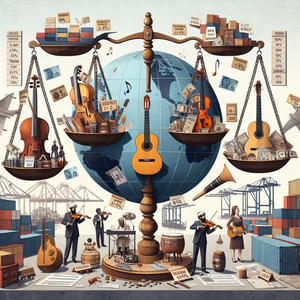
Navigating Tariffs in the Musical Instrument Industry: Challenges, Opportunities, and Evolving Careers
The global musical instrument industry is experiencing a seismic shift as steep tariffs, particularly those imposed on imports from China, reshape its economic dynamics. These tariffs, which range from 10% to as much as 60%, are creating significant hurdles for manufacturers, retailers, and musicians, especially for students and aspiring artists who now face rising costs for entry-level instruments. For companies, the ripple effects extend even further, disrupting well-established supply chains and escalating production costs. Some manufacturers are opting to relocate operations, while others are grappling with decisions to raise prices or, in some cases, shut their doors entirely.
Job Summaries:
The Economic Impact of Tariffs on Musical Instruments:
- Global supply chains are central to the musical instrument industry.
- A significant share of components and products are sourced from tariff-affected countries like China.
- Tariffs have increased costs by up to 60%, leading to higher instrument prices.
- Higher prices make instruments less accessible to budget-conscious consumers, including students and beginners.
- Manufacturers face additional costs, creating a domino effect.
- Manufacturers are exploring domestic production as an alternative.
- Challenges for manufacturers include maintaining affordability and ensuring product quality.
Supply Chain Manager:
- Develops strategies to source materials and components from alternative suppliers
- Negotiates contracts
- Mitigates rising costs caused by tariffs
- With supply chains disrupted, skilled managers are essential for maintaining affordability and availability of instruments
Domestic Manufacturing Specialist:
- Oversees the establishment of local production facilities, ensuring regulatory compliance and cost efficiency.
- The push for domestic manufacturing requires professionals who can navigate the complexities of reshoring production.
Trade Policy Analyst:
- Monitors evolving tariff policies, conducts risk assessments, and advises companies on compliance and adaptation strategies.
- Understanding trade laws and their implications is critical for businesses navigating the complexities of international commerce.
Instrument Repair Technician:
- Diagnoses and repairs instruments, offering cost-effective alternatives to purchasing new ones.
- As instrument prices rise, repair services are becoming more valuable to musicians on a budget.
Guitar Luthier:
- Crafts and repairs stringed instruments, often using locally sourced materials.
- With imported guitars becoming more expensive, custom, locally crafted instruments are gaining appeal.
Financial Analyst - Music Industry:
- Evaluates the economic impact of tariffs
- Forecasts trends
- Recommends strategies to minimize financial strain
- Companies need sound financial guidance to navigate rising costs and uncertain markets
Advocacy Consultant for Independent Musicians:
- Assists musicians in accessing grants, navigating financial challenges, and advocating for fair trade policies.
- Independent artists often lack the resources to absorb rising costs, making advocacy and support services crucial.
Marketing Specialist - Musical Instruments:
- Creates campaigns that emphasize value, quality, and sustainability to appeal to cost-conscious consumers.
- Marketing professionals play a key role in maintaining customer loyalty during periods of economic uncertainty.
Logistics Coordinator:
- Manages the transportation and distribution of musical instruments, addressing supply chain disruptions caused by tariffs.
- Efficient logistics are critical to ensuring timely delivery and minimizing additional costs.
Music Industry Advocate:
- Works with policymakers to promote fair trade practices and mitigate the negative effects of tariffs on the industry.
- Advocacy ensures that the voices of musicians, small retailers, and manufacturers are heard in legislative discussions.
The tariffs imposed on musical instrument imports have undeniably disrupted the industry, but they also present an opportunity for reinvention. From supply chain managers and domestic manufacturing specialists to luthiers and trade policy analysts, professionals across the industry are stepping up to address these challenges head-on. By embracing these evolving roles, the musical instrument industry can adapt, innovate, and continue to thrive despite economic pressures. This period of transformation is not just about surviving—it’s about creating new pathways for growth, creativity, and resilience.
Explore More JobsRecommended Articles
How Tariffs on Building Materials Are Transforming the Construction Industry: Challenges, Opportunities, and New Job Roles
How US Tariffs Are Transforming the Toy Industry: Challenges, Opportunities, and Emerging Careers
Trump Tariffs and the Media Industry: Shifting Careers, New Opportunities, and Unexpected Challenges